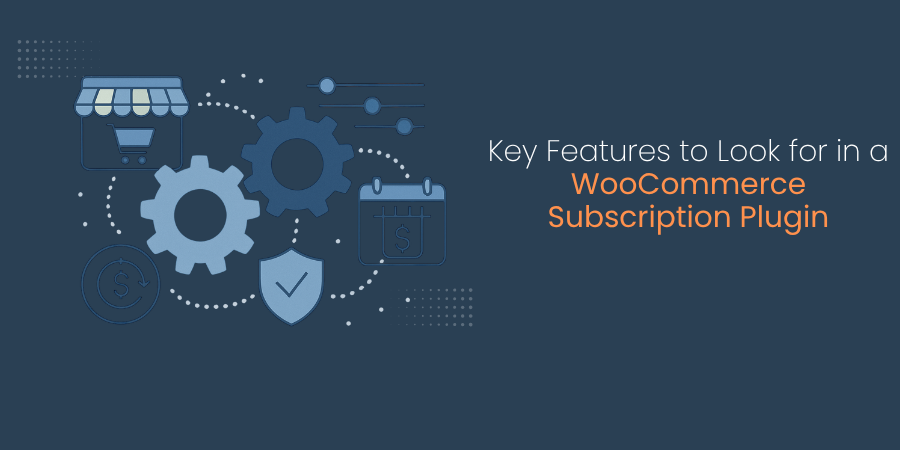WooCommerce vs BigCommerce – Which is Better?
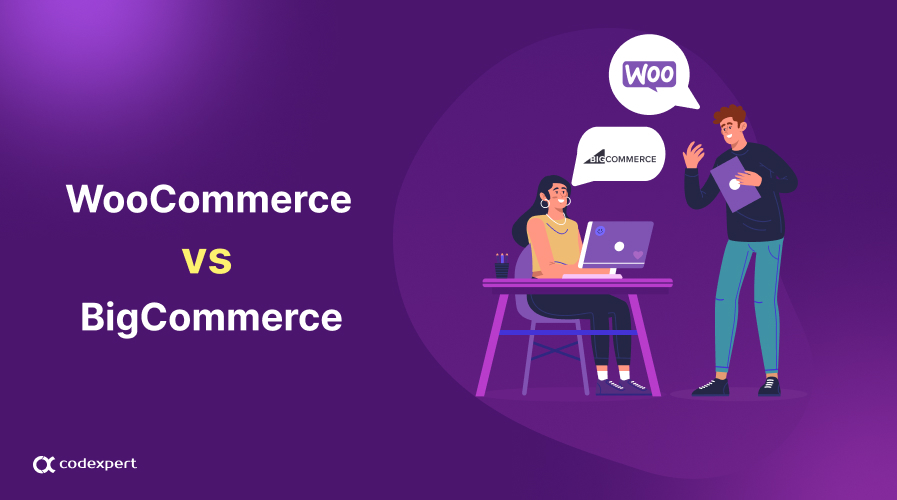
The digital marketplace is a competitive arena where having the right tools can mean the difference between success and obscurity. Two of the most prominent platforms for building online stores are BigCommerce and WooCommerce.
While both offer powerful features to help you sell products, they cater to different types of businesses and have distinct advantages.
This blog will provide a complete breakdown of both platforms, including their features, sales trends, and other considerations to help you choose the ideal launchpad for your eCommerce venture!
Stay tuned to know our final verdict!
WooCommerce vs BigCommerce – A Quick Overview
Before we take a deeper look at the features, let’s get acquainted with each of the platforms to understand the core performance better –
What is WooCommerce?

WooCommerce is a versatile platform that transforms your WordPress website into a powerful online store. As an open-source solution, it gives you unparalleled flexibility to craft a digital storefront that perfectly aligns with your brand vision.
From the ground up, you have complete control over the look and feel of your store. With a massive marketplace of themes and customization options, you can create a unique shopping experience that captivates your audience.
What is BigCommerce?

As a Software-as-a-Service (SaaS) solution, it handles the technical complexities and allows you to focus on running your business. With BigCommerce, you get a comprehensive suite of features out of the box, including product management, inventory control, secure checkout, and marketing tools.
Its user-friendly interface makes it accessible to technical and non-technical users, while its scalable architecture can accommodate businesses from startups to enterprises.
WooCommerce vs BigCommerce: A Head-to-Head Comparison
Choosing the right platform for your online store can be overwhelming. Let’s break down each feature to help you make an informed decision –
| Features | WooCommerce | BigCommerce |
| Ease of Use | Requires technical knowledge | User-friendly interface |
| Pricing Plans | Free plugin, but requires hosting and additional costs | Monthly subscription with different tiers |
| Payment Options | Wide range of options through extensions | Wide range of built-in options |
| Themes and Customizations | Highly customizable with themes and plugins | Good selection of themes with customization limitations |
| Inventory Management | Requires additional plugins for complex needs | Comprehensive built-in features |
| Integrations and Addons | Vast library of plugins for various functionalities | App marketplace with various integrations |
| Scalability | Highly scalable | Highly scalable |
| Security | Relies on WordPress security measures and plugin updates | Secure cloud-based platform with automatic updates |
| Support | Community-based support forums and resources | Dedicated support team via phone, email, and live chat |
Ease of Use
Both WooCommerce and BigCommerce offer different approaches to building and managing online stores. Let’s dive into how user-friendly each platform truly is –
WooCommerce
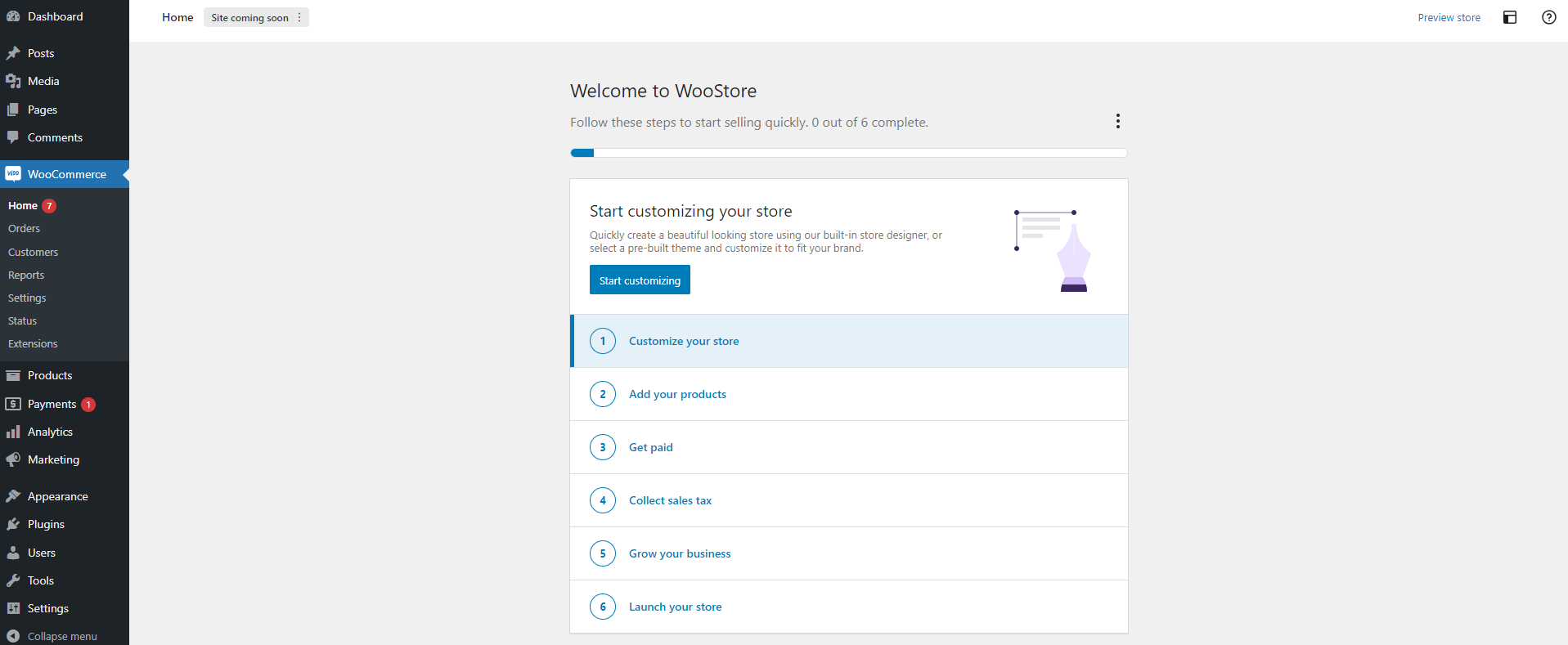
WooCommerce comes with extensive customization possibilities due to its open-source nature and integration with WordPress. However, this flexibility comes at a cost. You need technical skills to install and manage the core plugin, as well as additional extensions for full store functionality.
Maintaining a WooCommerce store, including updates, security, and performance optimization, can also be more complex compared to hosted platforms.
BigCommerce

BigCommerce, on the other hand, is designed with user-friendliness in mind. As a hosted platform, this platform handles the technical aspects and frees up your time to focus on running your business. BigCommerce comes with a clean and intuitive interface, making it easy to add products, manage orders, and customize your store’s appearance.
With drag-and-drop features and pre-built templates, you can create a professional-looking online store without extensive technical know-how.
Winner: BigCommerce is easier to set up for both beginners and those who lack coding expertise.
Pricing Plans
Budgeting is a major factor when it comes to choosing the right eCommerce platform. Here are the pricing plans for both platforms –
WooCommerce
WooCommerce itself is free to download and install. However, this doesn’t cover the entire cost of running an online store. You’ll need to factor in a web hosting plan, the cost which will vary depending on your website traffic and resource needs.
A domain name will typically cost around $10 to $15 per year and premium themes (if necessary) will cost upwards of $30. Also, remember to consider the price of any premium plugins and payment gateway transaction fees.
BigCommerce
BigCommerce has a subscription-based pricing model with several plans to accommodate different business sizes. Their plans include hosting, security, and essential e-commerce features.
While you won’t have to worry about separate costs for hosting or domain registration, the monthly subscription fee can be higher than WooCommerce, especially for smaller businesses.
BigCommerce offers monthly and annual packages, both of which start at $39/month.
Winner: WooCommerce is the budget-friendly option for beginners and enterprises.
Payment Options
Integration with popular payment gateways means customers can proceed with their orders with trust in your business. Here are the payment gateway options that can be integrated with each of the platforms –
WooCommerce
WooCommerce shines in terms of payment gateway flexibility. Its open-source foundation allows you to integrate with a vast array of payment providers using third-party plugins. This opens the door to popular options like PayPal, Stripe, and Authorize.Net, alongside niche or region-specific gateways that cater to your specific market.
Setting up and managing these integrations can require technical know-how and additional fees might be added for certain plugins or specific payment processors.
BigCommerce
BigCommerce, on the other hand, takes a more streamlined approach to payment options. The platform gives you a built-in selection of popular payment gateways, which means you don’t need any additional plugins or integrations.
While BigCommerce provides a good range of options, it may not offer the same level of customization as WooCommerce. Also, BigCommerce typically charges transaction fees, which can significantly impact your profit margins.
Winner: BigCommerce has a built-in selection of popular payment gateways, and setting up these integrations is easier than WooCommerce.
Themes and Customizations
While themes can make the journey significantly easier for the average store owner, the ability to customize can help you create a brand that perfectly aligns with your vision.
When it comes to the battle of WooCommerce vs BigCommerce, customizations are a major determining factor.
WooCommerce

As a WordPress plugin, WooCommerce integrates easily with a large marketplace of free and premium WordPress themes that create a strong foundation for your online store’s design, whether it’s for your homepage or individual product pages.
Also, with deep customization options available through child themes and shortcode modifications, you have virtually limitless control over every aspect of your store’s appearance and functionality.
WooCommerce also has product configurator plugins like CoDesigner, that allow customers to personalize their products of choice and offer better engagement.
BigCommerce

BigCommerce has a variety of professionally designed themes on its Theme Store, each catering to different industries and styles. While the platform itself doesn’t have nearly as many themes as WooCommerce, the available options are modern, responsive, and optimized for performance.
Customizations are managed through its intuitive Page Builder, letting you drag and drop elements to create and modify page layouts without any coding.
BigCommerce also gives access to HTML, CSS, and its Stencil framework, which is perfect for developers who want to build custom themes and modify them extensively.
Winner: WooCommerce’s marketplace for WordPress plugins is more extensive compared to that of BigCommerce.
Inventory Management
A streamlined inventory manager can take away a lot of headaches for online store owners, especially if you’re handling large stocks daily. Let’s take a look at the inventory management capabilities of both WooCommerce and BigCommerce –
WooCommerce
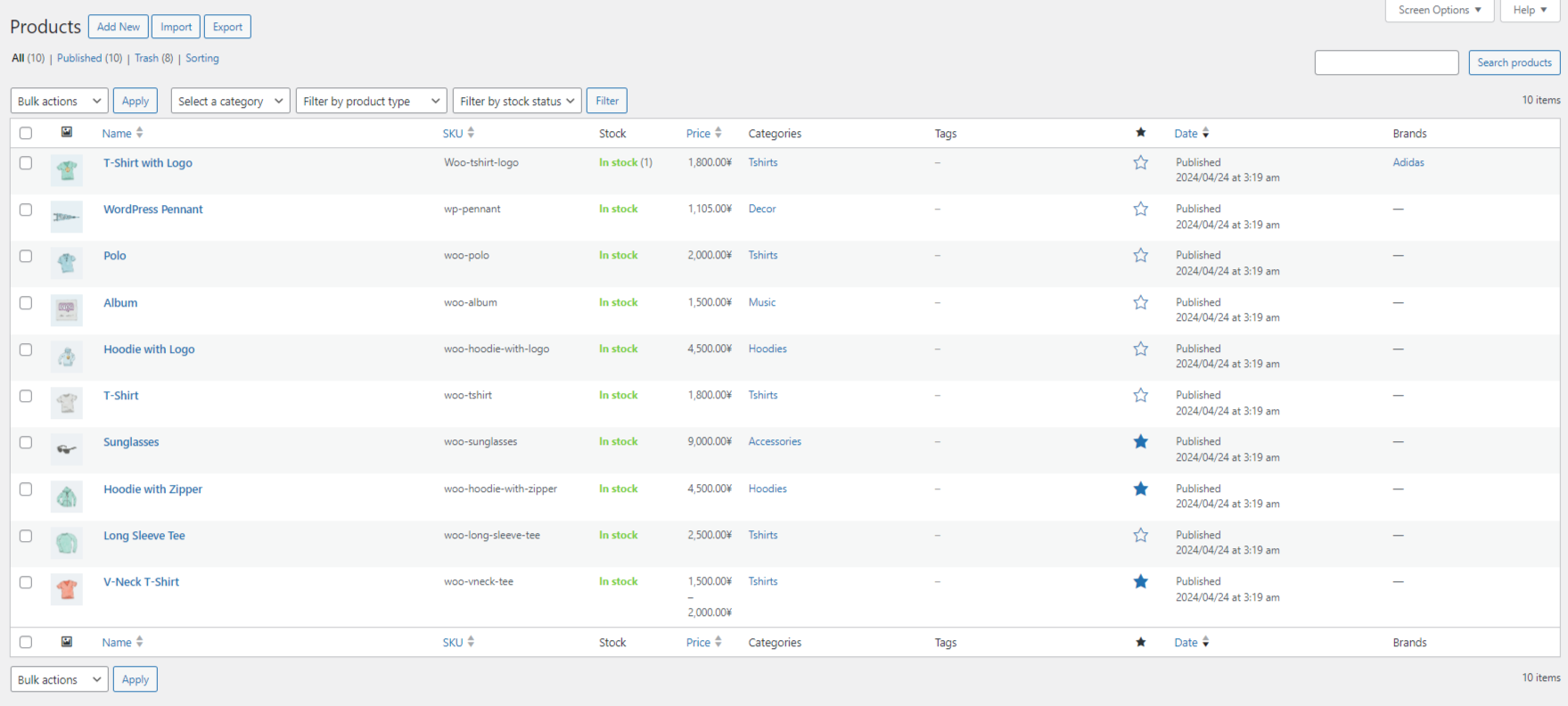
WooCommerce lets you manage their stock levels with precision, setting stock status for each product to either in-stock, out-of-stock, or on backorder. Its system automatically updates inventory levels when an order is placed to make sure stock quantities are always current.
You can set low stock and out-of-stock thresholds to receive notifications to restock inventory before it runs out. Also, WooCommerce lets you manage variable products to track inventory for different variations, such as size or color, separately.
You can also integrate multiple plugins to extend inventory functionalities, such as advanced reporting, multi-location inventory, and automated restocking.
BigCommerce
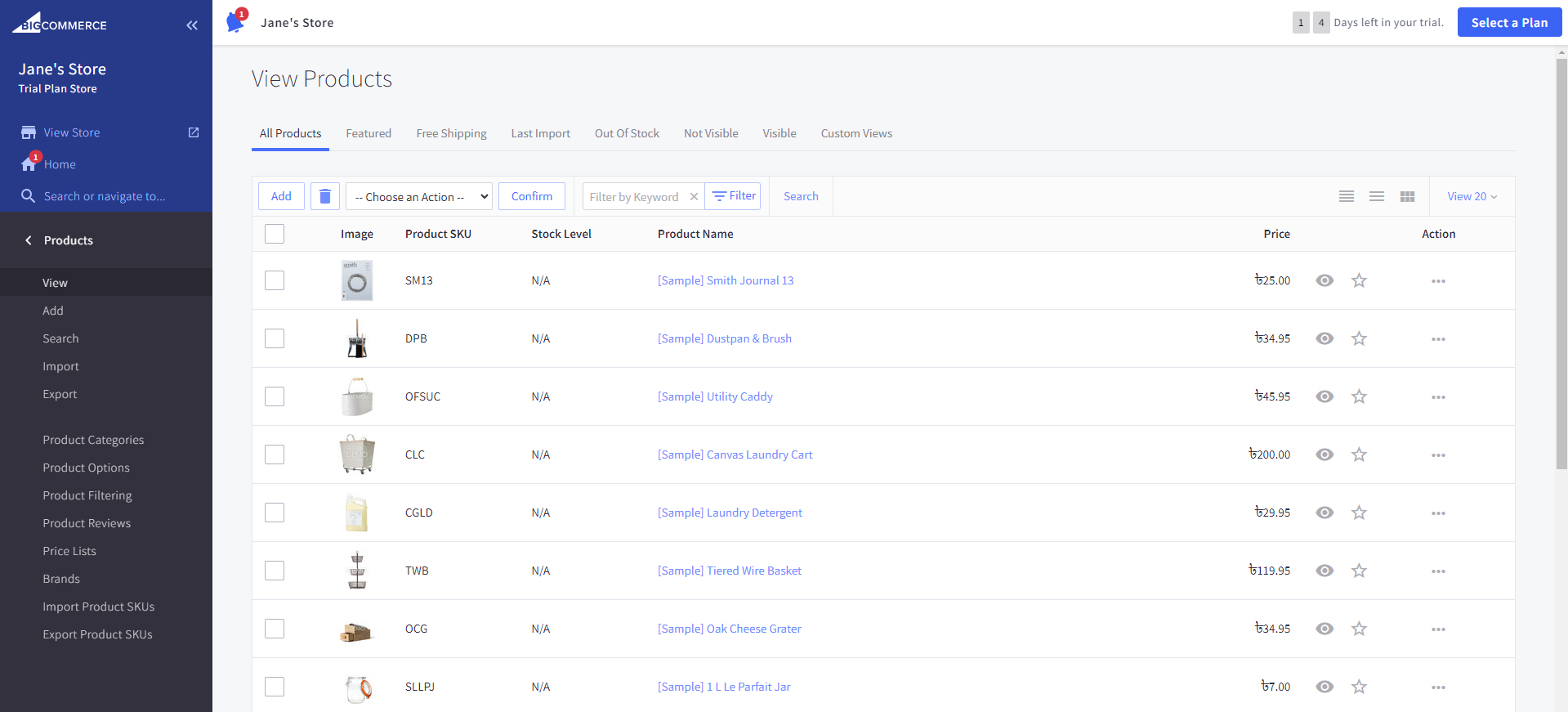
BigCommerce provides a centralized dashboard where you can track inventory levels across multiple sales channels, including online stores, marketplaces, and physical locations.
BigCommerce’s system also supports bulk product management to help you update stock levels for multiple products at once, which is especially beneficial for large inventories. And unlike WooCommerce, you’ll get automated inventory tracking, which updates stock levels in real-time as orders are processed, reducing the risk of overselling.
Winner: BigCommerce comes with automated inventory tracking and multiple sales channels to help keep large inventories updated at all times.
Integrations and Addons
The ability to expand your store’s functionality often hinges on a platform’s integration capabilities. Seamlessly incorporating free and premium add-ons can significantly impact how well your shop aligns with your vision.
WooCommerce
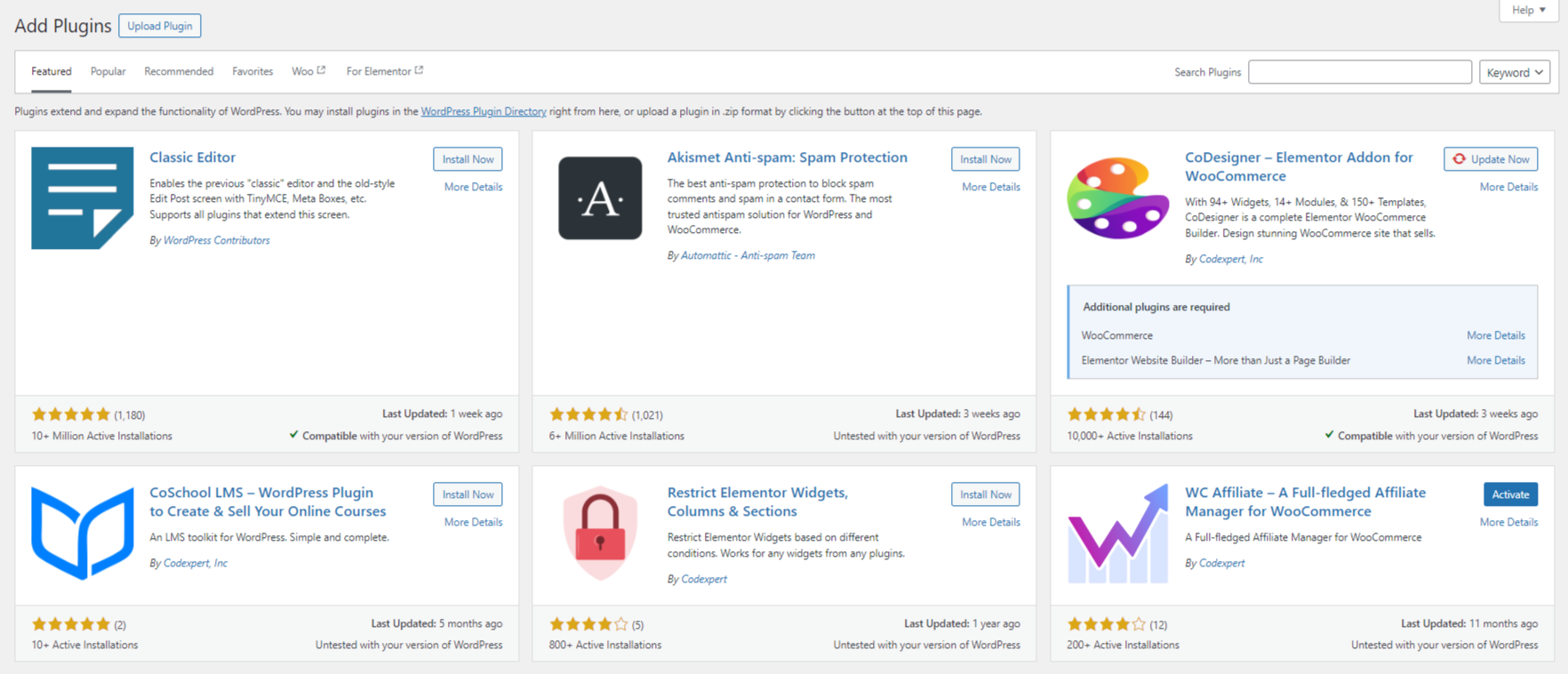
WooCommerce itself is highly flexible and benefits from the vast ecosystem of WordPress plugins and themes. As mentioned above, you can integrate payment gateways like Paypal, and Stripe and connect with various shipping solutions like UPS, FedEx, and DHL.
The platform also supports a wide range of marketing tools, including Mailchimp for email marketing, Google Analytics for tracking and reporting, and social media platforms for broader outreach.
The WooCommerce marketplace is teeming with thousands of free and premium extensions that allow store owners to extend their site’s capabilities as needed. With the WordPress REST API, developers can create custom integrations, making WooCommerce a highly adaptable platform suitable for businesses of all sizes and industries.
BigCommerce
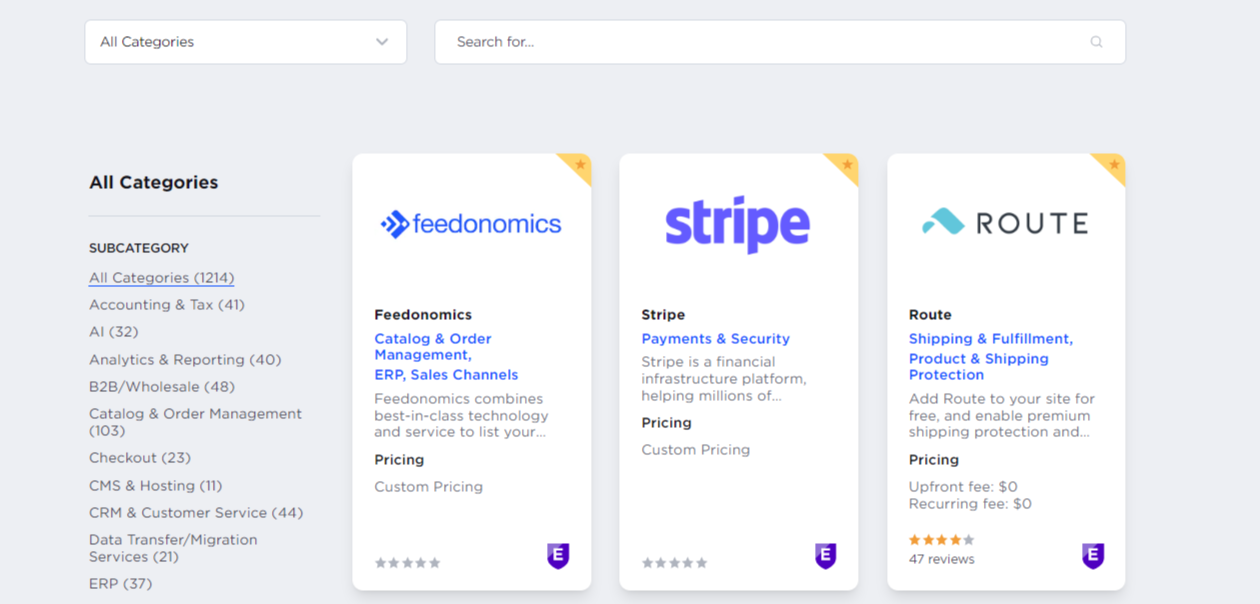
Similar to WooCommerce, BigCommerce also seamlessly integrates with leading payment gateways like PayPal, Stripe, and Authorize.net to ensure secure transaction processing. It also excels in integrating with shipping solutions like ShipStation, ShipperHQ, and FedEx, as well as, marketing and analytics portals like Google Analytics, Facebook Ads, and Mailchimp.
Its app marketplace features a large variety of add-ons that include tools for SEO, like the FavSEO app, and product management add-ons, such as Product Filter & Search and Bulk Product Editor. BigCommerce also supports advanced customer engagement tools like Yotpo for reviews and ratings, and Smile.io for loyalty programs.
And if you’re looking for custom integrations, BigCommerce’s open API gives developers the flexibility to connect third-party applications to handle specific business needs.
Winner: WooCommerce can integrate better with WP and third-party add-ons compared to BigCommerce.
Scalability
As your online business expands, so do your needs. Your shop’s platform must be appropriately scalable to handle increased traffic, orders, and products. Let’s look at the debate of WooCommerce vs BigCommerce, to see how they measure up in terms of scalability.
WooCommerce
WooCommerce relies heavily on the hosting environment and server resources allocated to the WordPress site. As a self-hosted solution, the scalability of WooCommerce largely depends on the infrastructure you invest in. As your store grows, you must ensure that your hosting plan can handle increased traffic, larger databases, and more complex operations.
You will also need expertise in server management and potential investments in third-party tools and services caching plugins and content delivery networks (CDNs) to improve performance.
BigCommerce
BigCommerce, in contrast, is a fully hosted eCommerce platform that handles the technical aspects of hosting, server maintenance, and performance optimization. This means that businesses using BigCommerce can scale their operations without worrying about the underlying infrastructure.
The platform is built to accommodate high traffic volumes and large product catalogs out of the box, so you can seamlessly grow your business. You can also find features like automatic server scaling, global CDN integration, and powerful APIs that offer seamless integration with other systems.
Winner: BigCommerce has more built-in scalability functions, compared to WooCommerce.
Security
When handling sensitive customer data, security is a major concern. Both WooCommerce and BigCommerce offer powerful security measures, but their approaches differ significantly.
WooCommerce
The security of a WooCommerce store is inherently tied to the security measures in place for the underlying WordPress installation. You (the store owner) are responsible for maintaining up-to-date software, including WordPress core, WooCommerce plugins, themes, and any additional plugins.
You need to keep everything updated, as they often contain patches for known vulnerabilities. Implement strong security practices like using secure, reliable hosting, employing strong passwords, implementing SSL certificates, and utilizing security plugins like Wordfence or Sucuri.
Also, WooCommerce itself does not handle PCI compliance, so you must ensure that your store’s payment processing is compliant with PCI-DSS standards.
BigCommerce
BigCommerce takes on the majority of security responsibilities by creating a powerful infrastructure designed to protect sensitive data. BigCommerce is Level 1 PCI DSS certified so all of their transactions are processed in compliance with the highest standards for payment security.
Unlike WooCommerce, this platform comes with built-in security features such as automatic updates, SSL certificates, and web application firewalls. BigCommerce also employs regular security audits, intrusion detection systems, and DDoS protection to safeguard against potential threats.
Winner: BigCommerce has out-of-box security features, compared to the self-hosted approach of WooCommerce.
Support
When issues arise, you need quick and effective assistance, and this is why support becomes a major factor. Let’s compare the support options in the battle of WooCommerce vs BigCommerce.
WooCommerce
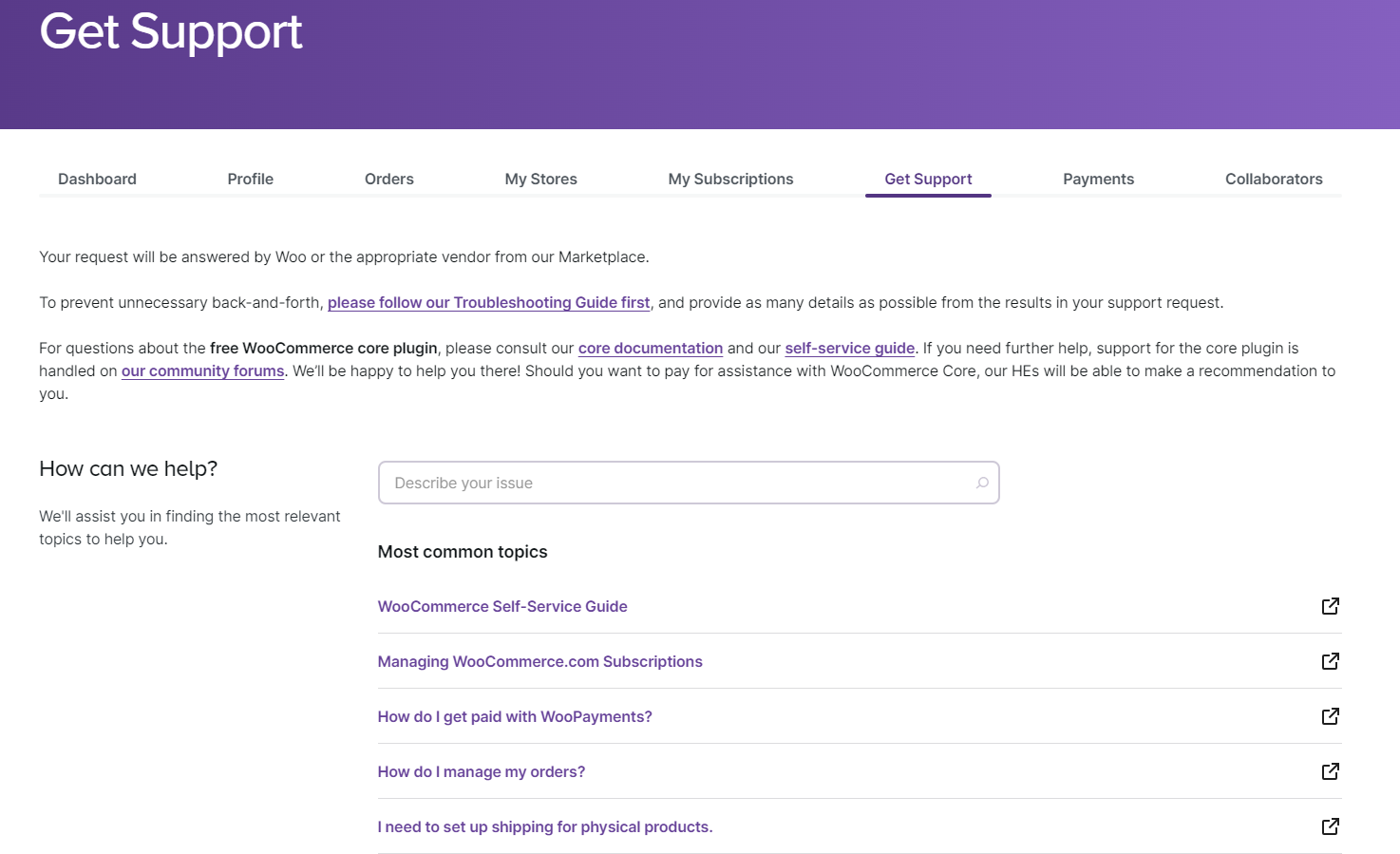
As an open-source platform built on WordPress, WooCommerce has a library of free documentation, tutorials, and forums where you can seek advice and solutions from other WooCommerce users and developers.
But if you’re looking for official support, WooCommerce has a portal for those who purchased premium extensions or themes. You can get support through tickets, with response times typically varying based on the complexity of the issue and your subscription level.
For more personalized assistance, you can refer to third-party developers and agencies for custom solutions. However, this decentralized support system may sometimes lead to inconsistencies in the quality and speed of the help provided.
BigCommerce

Conversely, BigCommerce has a more centralized and comprehensive support structure. You can get access to 24/7 customer support through various channels, including live chat, email, and phone.
Similar to WooCommerce, this platform also has a rich library of resources, including detailed documentation, video tutorials, and a community forum. Premium support packages are also available for priority support and a dedicated account manager for enterprise clients.
Without having to rely on third-party developers, you can get consistent and reliable support directly from the platform – whether you purchase a premium support package or not.
Winner: BigCommerce has extensive resources and free round-the-clock customer support, compared to WooCommerce; which only has free resources available.
Final Verdict: WooCommerce vs BigCommerce
BigCommerce and WooCommerce are both powerful platforms that you can use to start your eCommerce store. However, when you consider all the finer details in the battle of WooCommerce vs BigCommerce, BigCommerce stands out as the clear winner!
BigCommerce is an all-in-one solution, that manages backups, security, and scalability, and integrates seamlessly with WordPress for a hassle-free experience. Its comprehensive 24/7 customer support is perfect for businesses that need continuous uptime and immediate problem resolution.
On the other hand, WooCommerce gives you full control and lower initial costs due to its self-hosted nature. However, it relies on community support and requires users to manage hosting and security themselves, presenting a steep learning curve and scalability challenges.
We hope this comparison has shed light on the major differences in the clash of WooCommerce vs BigCommerce. To further assist your decision-making process, you might also find our comparison of WooCommerce vs Squarespace helpful.
Frequently Asked Questions (FAQs)
Q. Which is better, WooCommerce or BigCommerce?
The better option depends on your technical skills and budget. BigCommerce is easier to use but can be more expensive. WooCommerce offers more flexibility but requires more technical knowledge.
Q. Is WooCommerce better than Shopify?
Both WooCommerce and Shopify have their strengths. WooCommerce offers more customization and potential cost savings, while Shopify is generally easier to use and has a wider range of built-in features.
Q. Who is BigCommerce best for?
BigCommerce is best for businesses that prioritize ease of use, built-in features, and a managed platform. It’s suitable for those without extensive technical knowledge.
Q. Is BigCommerce SEO friendly?
Yes, BigCommerce is SEO friendly. It offers built-in SEO tools and features to help optimize your online store for search engines.
Subscribe to Our Newsletter
Get the latest WordPress tutorials, trends, and resources right in your inbox. No Spamming, Unsubscribe Anytime.

Thank you for subscribing to our newsletter!
Table of Content
- WooCommerce vs BigCommerce - A Quick Overview
- What is WooCommerce?
- What is BigCommerce?
- WooCommerce vs BigCommerce: A Head-to-Head Comparison
- Ease of Use
- Pricing Plans
- Payment Options
- Themes and Customizations
- Inventory Management
- Integrations and Addons
- Scalability
- Security
- Support
- Final Verdict: WooCommerce vs BigCommerce
- Frequently Asked Questions (FAQs)
- Q. Which is better, WooCommerce or BigCommerce?
- Q. Is WooCommerce better than Shopify?
- Q. Who is BigCommerce best for?
- Q. Is BigCommerce SEO friendly?











